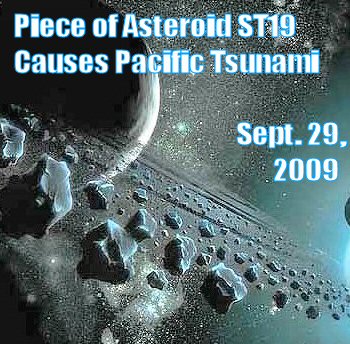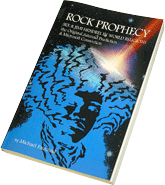 |
  |
 |
|
updated: December 30, "2009"
Timeline Page 9: July 2008 - December 2009 |

What's New & Previews
Jimi's Prediction —
A Remote View About Jimi Hendrix Timeline Blog Asteroid Impact Evolution Woodstock Blues Jimi Code VS. Da Vinci Code Credit Thefts Missile Agency/Moon Base Charade Remote View Mutation Seattleland Censorship Events Skewed Science Search Engine Rankings Download An Ad AT&T: New Nuremberg Wall(y)flower Syndrome Rochester Media DVD/CD Store More Links...  Rock Prophecy - TIMELINE - Page 9 of 9 pages:


Below is published the Timeline from Rock Prophecy. This is not the book, it is a chronological list of events surrounding the creation of Rock Prophecy. For a brief background and description of the story, and context for the Timeline below, visit the
ROCK PROPHECY PAGE before reading the Timeline.
. [NOTE: Timeline entries for June 2, 2008 through September 15, 2009 are not yet added to this website blog. We've kept track of all the relevant events and reports during that period, and will add them to this Timeline in the future. - First Century Press].
September 16, 2009:
September 23, 2009:
Just six days prior to publication of the Sept. 23rd NewScientist.com article quoted below, titled "Asteroid Attack," humanity came within 645,000 miles of extinction from a giant asteroid, and media worldwide closed ranks to hide the event. Some of the naive posts listed in the comments section to this article shown below are typical of a totally trained populace whose opinions have been carefully crafted by the elite class that controls media. One of the most bizarre and surreal experiences in life is to point out the facts about the Sept. 16, 2009 near extinction of civilization, describe how information about it is absent from media, and watch almost everyone you tell this to stare at you blankly, unable to comprehend what you've said. Many just rush to condemn you for delusions of "conspiracy theory." This incident alone can serve as verifiable evidence that J. Edgar Hoover was astutely correct when he said "The individual is handicapped by coming face to face with a conspiracy to monstrous he can't believe it exists." Without doubt the average simple-minded "folk" must cling desperately to fantasies of a "superman NASA" that can save us from asteroids, but they don't really have to because chance of impact is so low." That the opposite is true cannot be conveyed to these people - their ability to remain functional is dependent on fantasy thinking that's unaffected by whatever evidence is presented.
Space.com reports: "A small asteroid will buzz the Earth late Friday EDT, flying just inside the orbit of the Moon…The space rock, named 2009 TM8, was just discovered Thursday by the Catalina Sky Survey in Arizona. It will get within 216,000 miles (348,000 km) of Earth…'There're about 7 million of these objects in near-Earth space; we have discovered only a small fraction of them,' said Don Yeomans of the Jet Propulsion Laboratory. While NASA tends to focus on larger asteroid threats, and has found most of the big asteroids that could eventually threaten our planet, monitoring the smaller space rocks is also vital."
"There’s nothing we can explain to them. Most of it is from bitterness. If you start thinking negative, it switches to bitterness, aggression, hatred, whatever." - Jimi Hendrix Sept. 23, 2009: The NewScientist.com report titled, "Asteroid Attack: Putting Earth's Defenses to the Test"…The U.S. Air Force recently brought together scientists, military officers and emergency-response officials for the first time to assess the nation's ability to cope, should [asteroid threat] come to pass. They were asked to imagine how their respective organizations would respond…after just three days' warning…The exercise, which took place in December 2008, exposed the chilling dangers asteroids pose. Not only is there no plan for what to do when an asteroid hits, but our early-warning systems are woefully inadequate. "As a taxpayer, I would appreciate my Air Force taking a look at something that would be certainly as bad as nuclear terrorism in a city, and potentially a civilization-ending event," said organiser Peter Garreston. The latest space rock to put the frighteners on us was…first spotted it just 20 hours before impact - at a distance of 500,000 kilometers - and astronomers say we were lucky to get any warning at all…We are nearly as blind to objects big enough to do serious harm. We have barely begun to track down the millions of skyscraper-sized asteroids zipping around Earth's neighborhood, any one of which could unleash as much destructive power as a nuclear bomb on impact…Asteroid impacts are not as rare as you might think…The chance of a [1908 Tunguska-size] impact is about 1 in 500 each year. Put another way, that's a 10 per cent chance of an impact in the next 50 years. "Fifty-meter asteroids scare me to death," says Timothy Spahr, director of the Minor Planet Center in Cambridge, Massachusetts. "I could easily see a 50-metre object hitting in three days causing absolute pandemonium. I'm picturing people panicking and driving the wrong way on the freeway, screaming 'Oh my god, it's going to kill us!'" During the U.S. Air Force planning exercise, the participating scientists explained that with so little warning there would be no hope of preventing an impact…A 50-meter asteroid would weigh hundreds of thousands of tons, requiring an enormous push to change its trajectory appreciably - so much so that detonating a nuke near it in space would not provide a sufficient impulse so late in the game to cause a miss. To deflect an asteroid sufficiently, force would need to be applied years in advance. Realistically, though, the nuclear option would not be on the table in the first place: the nuclear-tipped missiles sitting patiently in silos around the world are not designed to track and home in on an asteroid or even survive for more than a few minutes in space. Instead, we would simply have to brace ourselves for the impact. To prevent panic and disorganized movement, it is crucial for authorities to develop an evacuation plan and communicate it to the public as soon as possible…[an asteroid] hitting the ocean would cause a giant splash that could smash coastal buildings with high-speed volleys of water. The tremendous damage…led NASA scientists in 2003 to rate ocean impacts by asteroids as far more dangerous than those on or over land. An asteroid flying out of nowhere and exploding over a sensitive region like the Middle East could be misinterpreted as a nuclear attack…The 2008 U.S. Air Force exercise could barely scratch the surface of the incoming-asteroid problem. It discovered that there is no plan for how to coordinate the activities of NASA, emergency planners, the US military and other parts of government. Further planning exercises are needed…Our chance of having any prior warning at all for an approaching 30-meter asteroid is no better than 25 to 35 per cent with existing sky surveillance…The Sun washes out half of the sky with daylight, blinding us to 50 per cent of threatening objects. Even glare from the Moon can hide unwelcome incoming guests. What's more, two of the world's three leading asteroid surveys are based in Arizona…The region tends to cloud over between July and September. NASA-funded surveys are limited to watching the skies of the northern hemisphere…Plans are afoot to construct the 8.4-meter Large Synoptic Survey Telescope [LSST] in Chile by 2015, though the project is still raising funds…[but] every ground-based lookout suffers from interference from the Sun and Moon. A dedicated space telescope would fix this problem, but such a mission could cost more than a billion dollars. While asteroid impacts are much rarer than hurricanes and earthquakes, they have the potential to do much greater damage. "It does warrant some priority in the list of things that we ought to be worried about," warns Johnson, "from what we know today it could be next week." The fastest way to deflect an asteroid away from Earth would be to send a nuclear bomb aboard a spacecraft, though we'd still need several years' warning. The spacecraft would have to be able to home in on the asteroid and to trigger the explosion at just the right distance. Precision is needed to avoid breaking up the hurtling rock while still giving it enough of a nudge to prevent the Earth impact years down the line. That assumes we're already prepared. Designing and building new spacecraft typically takes a few years. With current rocket technology, it would probably take several additional years to reach a threatening asteroid. And since the explosion would need to occur years ahead of the predicted impact in order to make the asteroid miss Earth, we'd need decades of lead time if we hoped to deflect Armageddon. A confounding factor is that nukes in space are forbidden by the Outer Space Treaty of 1967. - NewScientist.com - Sept. 23, 2009
[NOTE: This notion that nuclear bombs are effective in space is misleading. Here's the reasons why they won't work.] COMMENTS POSTED TO THE ABOVE ARTICLE AT NewScientist.com:
The idea that the solution to asteroid collisions is to "blast them to smithereens" comes from Hollywood movies. The reality is more complicated. Blasting an asteroid to smithereens is not as easy as one might think, and not necessarily productive. The effects of nuclear weapons in a [space] vacuum are significantly different to the effects in the atmosphere. Contrary to what one might see in Hollywood movies, asteroids would not disintegrate into harmless lights when a nuclear weapon detonates nearby…the major effect of the detonation will be surface ablation…by applying a few centimeters per second of velocity change [to the rock] early enough, you can make the object miss the Earth [but] this requires several years of lead time, and requires accurately tracking the orbits of far more objects than we do at present. But by the time an object is three days away, there's nothing you can do to prevent impact. - Pistachio T Wildebeest [NOTE: In the 1999 Rock Prophecy book, it is called "Retarded History."] We should have a world wide plan to handle such an emergency. It's not just our problem and expense, it's everyones's. But we have to first solve the problem of the Islamic countries tieing up our time, and resources, trying to kill us or convert us. We need an early warning system base located far out in space such as on Mars or the Moon, This would give us a better chance of survival as we would have more time to move a big rock or commet. - ronnie [NOTE: This notion of "Jupiter as Protector of Earth" is another commonly held misperception, as this scientific study shows, Jupiter actually flings rocks at us! The inability to comprehend Hendrix is ultimately the cause of human lack of preparation - Jimi's remote view isn't even a factor in any calculations opinion scenario, yet it's the key warning. Had he lived to produce his movie about it the course of history would have changed. Had the book Rock Prophecy not been censored and suppressed by Microsoft's Paul Allen, the issues would've been raised in "1995" - the last point at which we had a chance to avert the coming asteroid disaster. Dimissal of Jimi's warning and persecution of Rock Prophecy by these disgusting mean measly little sheeple leaves no sympathy for the pathetic creatures who're simply sitting ducks waiting for obliteration of this god-forsaken planet. They've brought this upon themselves, their civilization doesn't matter. Offical "risk assessments" for impact are ridiculously rigged and politicized to pacify consumers, as these sheeplized simpletons ahead demonstrate with their misinformed posts…]
There's a bit of scaremongering going on. The next time a bolide comes along and kills 10,000 people is probably thousands of years from now. We have many worse problems to deal with. - Eric Kvaalen [NOTE: Yeah, right, dream on you goofy delusional dominator, you'll soon be a pile of dust orbiting an insignificant little star spinning at the lonely outer reaches of the Milky Way.] October 8, 2009: On the anniversary of 1200 Americans being killed by space rocks, one of the most powerful meteor explosions ever observed occurred over Indonesia and media worldwide kept the incident hidden. But a local resident caught the sight on a cell phone cam and posted video online. Three weeks after the explosion, Space.com responded to the video:
"Wall Of Secrecy - 'Almost certainly it was detected and immediately identified as an explosion of a large meteoroid rather than, say, an explosion of a human-made device in the atmosphere,' said Clark Chapman, a noted specialist on asteroids. 'But these satellites are [classified] secret and, in the past, the establishments controlling them have delayed releasing the data, for weeks or months.' Earlier this year, Chapman added, a change in previous policy led the U.S. military to withhold the data from the public. 'Scientists hope that [the Pentagon] will reverse that policy. This event will demonstrate...the wall of secrecy because of the passage of weeks since the [Oct. 8th] event and there has been no decision to release the data promptly." - Space.com - Oct. 29, 2009
It's Top Priority of the global elite that we shrug off the odds of a hit as they make their escape.
October 16, 2009:
"Chaperone" Fragment of Asteroid ST19 Classified As Near-Earth-Object 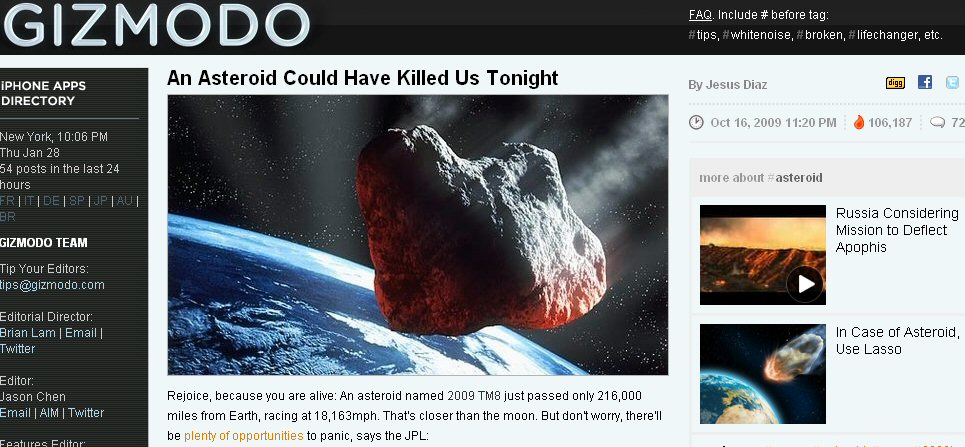 [NOTE: "Has found most of the big asteroids" - making this absurd statement as a fact assumes that most readers have no clue about the vastness of our solar system and the constantly changing number of asteroids that fly through it, altering their course in response to other celestial objects near their paths. Just a month earlier, on September 16, 2009, a giant civilization-killer asteroid sneaked up on us undetected. When it was finally spotted by an amateur astronomer all mass media worldwide closed ranks to suppress the news. When it comes to space rocks, we truly "don't know what we don't know." All we can be certain of is that we CAN'T TRUST ANYTHING SAID BY MOGUL CONTROLLED MEDIA/GOVERNMENTS. Human technology is nowhere near developed enough to track all asteroids. That government agencies repeatedly claim otherwise indicates a desperate intent to train us to dismiss the chance of impact.]
COMMENTS POSTED TO THE ABOVE ARTICLE AT Space.com: December 16, 2009: Wired.com reports: Asteroid-deflection efforts will have to start years before a prospective impact and will have to be essentially international. "Whether or not the international community, within or outside the United Nations, can rise to the demands of such a challenge in advance of an impact," says [Apollo astronaut] Rusty Schweickart, "is problematic." "Today's society is unable to raise a defense in time to stop the Rock…Hendrix presents a picture of disaster resulting from our inability to organize world resources in time to stop the rock from coming at us." - Rock Prophecy book, 1999 Nuclear weapons have been explicitly outlawed in space since the Partial Test Ban Treaty was negotiated in 1963. Sending a nuclear weapon into space to hit an asteroid would require modifying the treaty, which could have unforeseen negative repercussions…and difficult international negotiation. [Schweickar's organization] propose to bump or tow an asteroid "in a controlled manner" so that it misses Earth. The only problem is that such a process would take time and as the asteroid's trajectory changed, it would be "pointed" at different places along a horizontal plane on Earth called the "risk corridor." That's a major geopolitical problem, Schweickart said, because it requires temporarily increasing the risk to one population. Who gets to decide which way the asteroid is dragged away from an impact with Earth? The United Nations? The United States? Russia? Some independent body of astronomers and space agencies? Earlier this year, the Association of Space Explorers presented a report to the U.N. Committee on the Peaceful Uses of Outer Space recommending that some international decision-making bodies be created to evaluate and respond to near-Earth object hazards. The U.N. committee could bring some options before the General Assembly by 2012, although Schweickart has some doubts that people are politically prepared to deal with the tough decisions that humanity could face to deflect an asteroid. "You're going to have to make that decision when the probability is less than one, 10 or 20 years ahead of time," he said. "That's not easy for anyone, let alone the United Nations."
- Wired.com - December 16, 2009
COMMENTS POSTED TO THIS ARTICLE ABOVE AT Wired.com:
If the rock is heading toward the USA, I'm voting that we talk about your treaty later and nuke the thing. - IraMeanwell [NOTE: As with most news website "Comments" section postings, we see loads of simple-minded posts, like those above, mixed in with a few insightful remarks, like those below…] I see a big problem with any of these plans…it's all theoretical! Who knows if any plan we have will actually work? - careydwDecember 16, 2009: NASA's Jet Propulsion Laboratory releases a video animation of what the approach of Apophis will look like from the perspective of the asteroid: COMMENTS POSTED TO THE ABOVE VIDEO AT Wired.com: What a horrible video. Every frame of it makes it look like it's on a direct collision course with Earth. - phillydrifter [NOTE: "Look like it's on a direct collision course" - that's because IT IS on a collision course…psst…shhhh…moguls don't want us to know…]
[NOTE: The timing for the release of this video is significant. The world's "rich elite" are setting the stage for "Asteroid President Obama" to make the Big Speech his political campaign was arranged and engineered to deliver. But first the Russian component of this Global Mogul Cartel has to furnish a "competitor straw man" to confront, riling the sheeple to demand NASA launch rockets out to asteroids to counter a "Russian threat"…] December 30, 2009:
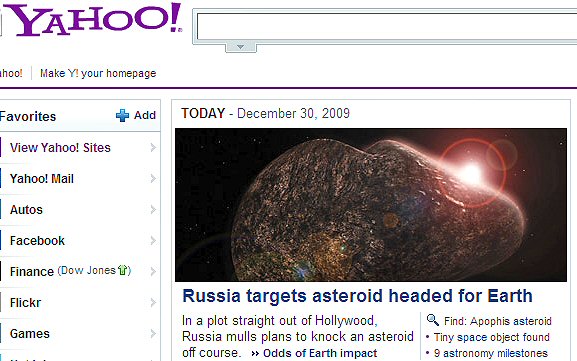 AFP - Dec. 30, 2009 "Russia Plans to Save Earth From Rogue Asteroid" is the headline at Wired.com: "In an interview today with Voice of Russia Radio, Russia's space agency chief Anatoly Perminov said discussions would begin soon over a plan to save the world from a collision with a massive asteroid. Astronomers initially guessed that Apophis had a reasonably good chance of smashing into Earth on its first flyby [Friday the 13th, April 2029]; NASA now reckons that the chances of that have gone from slim to almost none. But despite the lower NASA estimate, the Russians aren't so sure. Perminov said the asteroid 'will surely collide with the Earth in the 2030s.' Asteroid-deflection would demand a lot of international cooperation. And a lot of money. 'People's lives are at stake,' Perminov, said. 'We should pay several hundred million dollars and build a system that would allow to prevent a collision, rather than sit and wait for it to happen and kill hundreds of thousands of people'…Rusty Schweickart [Apollo astronaut] writes in praise for Russia's space agency."
COMMENTS POSTED TO THE ABOVE ARTICLE AT Wired.com:
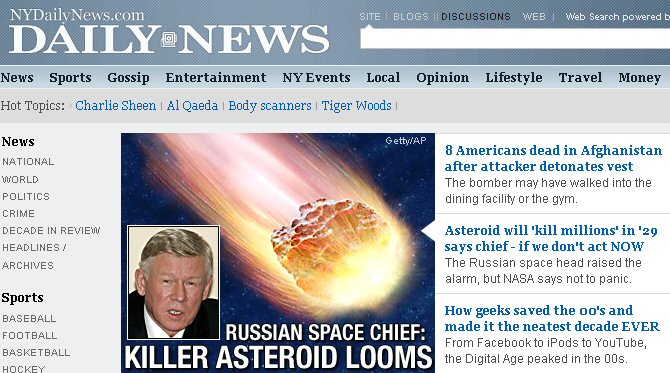 Dec. 30, 2009 "Russian scientists will soon meet in secret to work on a plan for saving Earth from a possible catastrophic collision with a giant asteroid in 26 years, the head of Russia's space agency said on Wednesday. 'We will soon hold a closed meeting of our collegium, the science-technical council, to look at what can be done' to prevent the asteroid Apophis from slamming into the planet in 2036, Anatoly Perminov told Voice of Russia Radio. RIA Novosti news agency said the asteroid is expected to pass within 30,000 km [about 18,000 miles] of Earth in 2029 - closer than some geo-stationary satellites - and could shift course to hit Earth seven years after that." - Yahoo.com, Dec. 30 2009
"Without mentioning NASA's conclusions, Perminov said that he heard from a scientist that Apophis is getting closer and may hit the planet. 'It could hit the Earth by 2032,' Perminov said. 'We should pay several hundred million dollars and build a system that would allow us to prevent a collision'…Perminov wouldn't disclose any details of the project…Boris Shustov, the director of the Institute of Astronomy under the Russian Academy of Sciences, hailed Perminov's statement as a signal that officials had come to recognize the danger posed by asteroids. 'Apophis is just a symbolic example, there are many other dangerous objects we know little about,' he said, according to RIA Novosti news agency." - AP and Foxnews.com, Dec. 30 2009
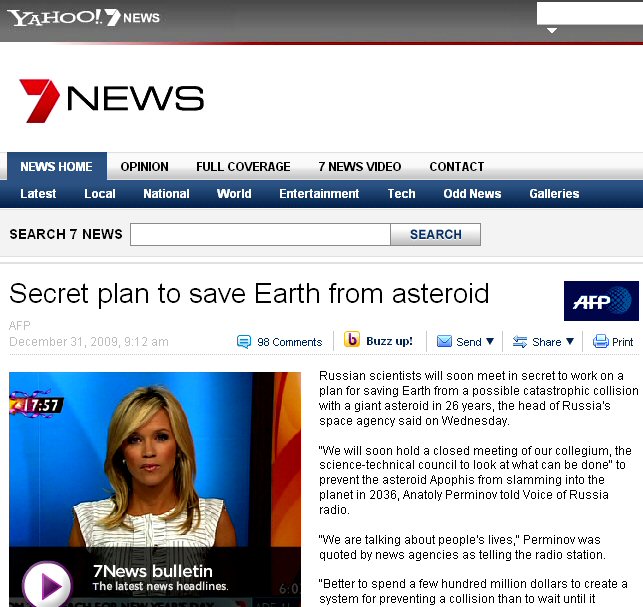
COMMENTS POSTED ONLINE ABOUT RUSSIA'S PLAN: [NOTE: This assumption that we "know" the accurate path of Apophis is an article of faith to consumers who think it's blasphemous heresy to doubt that "astronomers know" the asteroid will bypass Earth, only delusional conspiracy paranoids would question the experts. But the pinnacle of disinformation from H.I.M.M. is insistence that no one is too blame for future asteroid disaster. That Rock Prophecy describes otherwise and places blame makes that book the bane of dominators and target for billions spent to prevent any mention of it in media. To even suggest this is to incur the ire of those subliminally programmed to persecute you who know we're doomed. It's a situation akin to the plot from Invasion of the Body Snatchers; people who've been "taken over" and diredted to fulfill some sinister agenda. Like an episode of the 1960s TV series The Invaders: hi-jacked brains, occupied bodies, the Alien's Trojan spore gestating in the acidic pit of their lizard innards, hypnotized robotic pods, remotely controlled zombie bombers, the infected "hosts" who've been harvested to carryout Master's Plan. In order to save invaded brains, it has become necessary to destroy invaded brains…]
COMMENTS POSTED AT Space.com ABOUT RUSSIA'S PLAN:[NOTE: "The Russian space agency was just chosen to announce this" - that's exactly right. Moguls are following a decades-old script of contingencies from those who have world media/governments under total control. Today's Russian ruse is preparation for the upcoming announcement that America's "Asteroid President" was ushered and puppeteered into office to make. Sheeple are now trained to say, "Look, we have to compete with the Russian threat…" Hundreds of trillions of dollars are today being sidetracked and siphoned out of world economies in a desperate attempt to deflect asteroids, while suppressing any mention of the Hendrix vision that warned us, and condemns us…] .
The asteroid story can't be taken any further by media. A similar thing happened with the Hendrix story. Several dozen "Hendrix books" have been published and in a sense they're all "the same book" because they follow a narrow menu range of concepts about Hendrix, ideas that the media elite approve of and permit/finance. Statements about Hendrix that don't fit into this narrow litmus test list of concepts are weeded out, left unpublished.
We are in a period where the same thing has happened to the "asteroid story." The media elite have defined the "dozen high concepts" that published reports about asteroids follow. Ideas like those expressed in Rock Prophecy are excluded. But the blitz of asteroid stories and reports listed in the Timeline above, and triggered by Rock Prophecy, now set the stage for a text of revolutionary context surrounding the asteroid issue. Rock Prophecy is a philosophical horror story - what the anti-equality unfree elitist media is most concerned to obstruct and crush. When the book Rock Prophecy is read from beginning to end, come back to the listings above and gauge for yourself whether or not my manuscript influenced wealthy string-pullers who set an agenda for asteroid issues in mass media. Was my manuscript studied at the LOC by paid consultants for someone? In response to the contents of Rock Prophecy strategies were devised to use media to influence the public's attitude towards asteroids. The reports listed above all appeared after my research was sent to the Library of Congress. Co-opting the asteroid story and overexposing it in mass media has the effect of distancing the issue away from Hendrix. Left out of all media reports about asteroids are the implications that Jimi's Prophecy holds for world history and religions. Those implications are explained in Rock Prophecy. Because stories about asteroids were relentlessly reported during 1996 and 1997 and 1998, this book has been made to appear like an example of what The New York Times calls "bandwagoneers whose sudden interest in asteroids was excited by the smell of money." But the 1995 copyright date of my manuscript proves that the opposite is true: Rock Prophecy was NOT inspired by stories in the media, rather, the men who control media were inspired by my research. What the ruling class seeks is this: when the asteroid is finally discovered coming towards Earth, the men who control media can now say, "This is not a Hendrix Prophecy! Many people were predicting an asteroid disaster and reporting the threat, if Hendrix was on to this too, it's just a meaningless coincidence." Keep in mind the following: 1) No one anywhere understood Jimi's Prophecy until I deciphered his writings and copyrighted the explanation on June 5, 1995. 2) More than four decades ago Hendrix envisioned an asteroid disaster. He was not just aware of the threat, he predicted in 1969 that "in about thirty years" we'll see what he means. 3) The escalation of asteroid stories that appeared in the media, starting in October 1995, five months after Rock Prophecy arrived at the Library of Congress, suggests that my writings are being monitored at the LOC. 4) A third of Rock Prophecy explains Jimi's prediction. The rest of the book explains how and why men have designed world religions to control women and maximize access to sex. Throughout history it's been these beliefs and customs that have brutalized half our race and stifled human advances that otherwise would have surfaced. Technology has been impeded. We are left defenseless against random impacts from space. Our ruling class of dominators will arrange to confiscate all copies of Rock Prophecy. They aim to erase every trace of this book. As the asteroid approaches and civilization nears its end, dominators intend that during our final years the unjust monied, so-called "rich," will enjoy access to underserved privileges in unlimited amounts. Rock Prophecy reveals what Jimi tried to communicate: dominators have enslaved humanity and left us prone to a catastrophe that need not have been. EstablishMENt think tanks have monitored the world's network of Hendrix researchers since before Jimi's death in September 1970. When the connections in Rock Prophecy start to circulate beyond dominator censorship, the men who control media will condemn this book and obstruct publicity about it. Resist by spreading word. Anyone who can help, please contact First Century Press . One final thought. Over a century ago, in 1898, German and French astronomers Gustav Witt and A. Chalois discovered one of the largest known near-Earth asteroids (21 miles wide) and named it "Eros." The word Eros is defined in the Random House Dictionary as the Greek word for Love. Eros is the "god of Love, son of Aphrodite, identified by the Romans with Cupid...a winged figure...representing the power of love...physical love and sexual desire." Eros is the asteroid that inspired the name Jimi gave to another Rock that he saw hurtling towards Earth. Hendrix kept a statue of Cupid in his apartment. Part of the figure's wing was missing..."That's the groovy thing about him, he can fly with a broken arm." - Jimi
|

